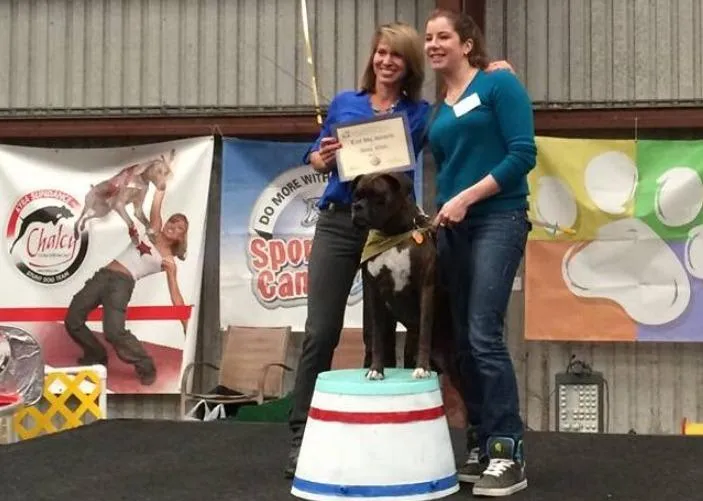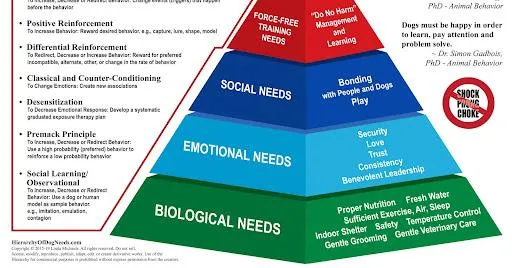Amelia Kellum B.Sc., CPDT-KSA, CTDI
Serving Hope and Chilliwack
Amelia is on maternity leave until 2023
Amelia Kellum is a certified professional dog trainer with nearly two decades of experience training dogs - including hunting, acting, and assistance dogs such as hearing, therapy, guide, and mobility dogs.
Amelia holds a Bachelors in Assistance Dog Education from Bergin University in Santa Rosa, California and is also a graduate of the Ben Kersen and the Wonderdogs professional trainer's program.
Amelia counts many of the North West's best trainers in her list of mentors, including:
Dr. Bonnita Bergin - Inventor of the mobility assistance dog and founder of Canine Companions for Independence.
Glenn Martyn - Head trainer of the San Francisco Hearing dog program and former head trainer of the Guide Dogs for the blind program in San Rafael, California.
Georgina Bradley, 'Top Dog' at DogStars, an animal talent agency.
Kyra Sundance - Author of 101 Dog Tricks.

Amelia's extensive training experience includes training service dogs for Pacific Assistance Dogs Society and West Coast Assistance Teams in Burnaby, B.C. where she taught dogs to help people with disabilities such as paralysis, Multiple Sclerosis and Cerebral Palsy.
Amelia has also taught pet dogs like yours privately and in group settings for companies like PetCetera, earning certification as a group class instructor with Animal Behavioural Training Associates in 2005. Her own boxer, Doug, earned his Champion Trick Dog title!
Amelia can teach a dog to do pretty much anything:
Want your dog to win a trick competition or learn something special to help, amaze or just amuse? How about jumping over your head, getting a beer from the fridge, picking up laundry and then turning out the lights?
Want your dog to quit pulling on leash and start picking it up and handing it to you nicely? This is your kind of trainer.
Certified in Pet First Aid by DogSafe and taught by Dr. Anne Stark DVM as part of her schooling at Bergin University in canine health, Amelia has cared for fleets of up to 150 dogs, capable of anything from administering basic medical care to whelping litters (including providing amazing training IN the whelping box!).
Amelia's training methods are fun, fast paced, and hugely rewarding for dog and owner alike.
Amelia will return from Maternity Leave in fall of 2022.

Dog Misbehaving? Do This FIRST
Having Trouble With Your Dog? Do This First.
If you tell someone you're having trouble with your computer, the first thing someone will ask you is "have you tried turning it off and on again?" This solves so many problems that it's a good first step before trouble shooting any computer difficulties.
Well, it's the same way with dogs. Any time you are struggling with your dog's behavior, we need to talk about the basic expectations we have to meet when we begin a relationship with a dog.
I want to talk about the biggest cause of problem behaviour and, of course, how to get the dog you dreamed of.
You Must Meet Your Dog's Needs.

Your dog is completely dependent on you for meeting all of their most basic needs.
As the guardian of your dog, it is your responsibility to make sure your dog gets the things they cannot provide for themselves.
You are obliged to ensure their core needs are met BEFORE you have the right to expect anything from them in return.
Your dog needs:
Good food and fresh water
Physical stimulation
Mental stimulation
Time spent with people
Time spent learning how to work with people
Time to act like a dog, including:
running
digging
chewing
hunting
sniffing
playing with other dogs
Provide these needs... or suffer the consequences!
A dog who is struggling to get their most basic needs met does not have the physical or emotional wherewithal to work with you in a cooperative fashion.
Either you are the person who provides all the things they need and want, which makes them want to do things for you in return, or you're the warden who's always trying to stop them from meeting their own needs, in which case your dog will be resentful and recalcitrant.
A Satisfied Dog Is A Good Dog
People who recognize that their dog needs to gnaw on something for a couple of hours a day and run around like a crazy fool on a daily basis will end up with a happier and better behaved pet.
One of the wonderful things about dog training is that it taps into many of your dog's needs. It provides that mental and physical stimulation that so many pets are missing from their daily lives, and it gives them that time spent learning and playing with their favourite person.
Even better, most "tricks" that we can teach our dogs to perform also tap into some of their favourite things to do, like grabbing, chasing, and tugging.
The more you focus on meeting your dog's needs in fun and creative ways, the more you and your dog will be able to achieve together.
Teaching your dog skills, tricks and using consistent obedience isn't just about impressing your friends and neighbours. It helps to create an ever-increasing vocabulary - a language between you and your dog.
This communication will strengthen your bond beyond belief. Talk to your dog about everything, and take them everywhere you can. Make sure your dog gets out there and runs and jumps and plays.
This is the first and most important remedy for every single problem anyone has ever had with a dog.

Your dog barks too much? Could be boredom. Could be anxiety. Could be over-excitement.
Solution? Get them out to run and play more!
Your dog jumps on people?
Get the tickle out of their feet and do some running and jumping BEFORE people come over, so your dog has already had their fill.
This doesn't mean that you need to run your dog for hours and hours each day (although you may, depending on the dog).
Taking the dog for daily 10 km runs will just train a tireless athlete.
But it means you should ensure that your dog is getting plenty of time to be a dog.
How much time does your dog need to spend playing bitey-face with other dogs, sniffing in the woods, and digging at the beach to be calm and happy? Well, that depends on your dog. But every dog needs at least some of that on a daily or at the very least weekly basis.
You can meet the need for mental challenges by playing games that challenge your dog's memory, problem-solving, and senses. You can meet the need for physical engagement with some strong rounds of tug and maybe a bit of doggy parkour at the park.
Until you have met your dog's needs, you have no reason to expect that your dog will be able or willing to meet yours.
Before you even think of addressing the problem behaviour specifically, we need to be sure their needs have been met and they are set up to succeed.
That's always the first step, whatever comes after.







